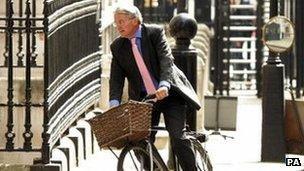Sexual offences: Wrong questions asked of victims, says Keir Starmer
- Published
Keir Starmer on the Andrew Marr Show
Victims of sexual offences have been afraid of reporting them because police have asked "the wrong questions", the director of public prosecutions for England and Wales has said.
Keir Starmer told BBC One's Andrew Marr Show "crude tests" had been used to question if victims would be believed.
They included whether offences had been reported straight away, he said.
But there had been "a fundamental shift" in how victims had been treated in recent years, he added.
Mr Starmer, who will step down later this month after five years in his role, said: "The key issue I think is this that we've got an adversarial system and that means that the prosecution must put up its best case and the defence then challenge that robustly," he said.
"Inevitably that means that the police and prosecutors, when a victim comes forward, ask the question 'is this person going to survive, are they going to be believed'?"
He said that, in the past, "many victims didn't have the confidence to come forward because we were asking the wrong questions".
"If you go into a police station and report a burglary the first question is not 'are you telling the truth'?
"If you are the victim of a sexual offence, very often in the past that has been the first question."
'Proper investigation'
Mr Starmer said the assessment of whether a victim was believable "starts from the very start" and that the Crown Prosecution Service had "done a huge amount of work to change that".
He said that, for the past two years, he had tried to "fundamentally shift where we are in these cases to make sure that the police and courts are with us".
"The first thing you do is you change the tests," he said.
"You make it clear that, if you come in to report this sort of offence, you are not going to be tested according to whether you've reported it straight away, whether you give a consistent account, whether you've ever yourself had drink or drugs etc."
He said that, if victims knew that "you will come in, give your account and then there'll be a proper investigation", it would give them more confidence to come forward.
Earlier this year, Mr Starmer announced that a new College of Policing, with the agreement of the CPS and Association of Chief Police Officers (Acpo), would develop a new strategy to replace the existing 19 sets of guidelines for investigating child sexual abuse.
As a result, prosecutors have been told to focus on the credibility of allegations, not on whether victims make good witnesses.
The change was introduced after it emerged that some of Jimmy Savile's victims were reluctant to pursue their individual complaint because they thought they were the only accuser.

Andrew Mitchell resigned as chief whip after the row over an incident outside Downing Street last year
Speaking on the same programme, Mr Starmer also rejected criticism of the Human Rights Act by Conservative ministers who have said the party's next manifesto will promise to scrap it.
"The Human Rights Act is a really important constitutional instrument. It isn't just a villains' charter - it has been a real asset to victims and witnesses," he said.
"And if you trace their rights, you'll find them written in the Human Rights Act so, for me, it would be a retrograde step to repeal or amend the Human Rights Act."
He also said he understood why there was "concern about the delay" over the "plebgate" row involving ex-government chief whip Andrew Mitchell.
Mr Mitchell apologised for not treating police officers with respect during an incident at Downing Street's main gate in September 2012 but denied newspaper claims he called police "plebs".
Eight people have been bailed in the inquiry that followed the row.
Mr Starmer said that, earlier this month, "the file in this particular case arrived at the CPS" and he would not "fall into the trap of commenting on the case at this critical stage".
"It's under consideration by us - we've now got we need and we'll come to a view just as swiftly as we can," he added.
- Published13 October 2013
- Published4 October 2013
- Published11 June 2013
- Published6 March 2013
- Published24 April 2013